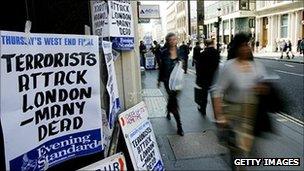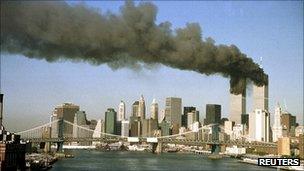Is the UK safer now than on 9/11?
- Published

Met police have been training with the SAS in a series of "worst case scenario" exercises
When those heavy black crash barriers were lowered into place outside the Palace of Westminster in 2003 they raised a lot of eyebrows.
Yes, America had been attacked on 9/11 but over here in Britain would anyone really want to ram a truckload of explosives into the Houses of Parliament?
It seemed almost unthinkable. After all, Britain had provided sanctuary to so many dissidents fleeing oppressive regimes in the Middle East. Why would anyone want to attack such a beacon of democracy and free speech?
But in that same year, 2003, Britain took part in the US-led invasion of Iraq.
For al-Qaeda, driven out of Afghanistan and running short of recruits, this was like breathing new life into dying embers.
Here was a cause that could ignite anti-Western fury and propel countless numbers of international jihadists to go and fight the invader in Iraq.
Strategic mistakes like disbanding the Iraqi army were followed by scandalous revelations of abuse by US soldiers at Abu Ghraib prison and further, isolated allegations against British troops.
Suicide bombings
Back in Europe, jihadists struck Madrid's commuters as they rode trains into work in 2004.
And yet, when on the morning of 7 July 2005 Mohammad Sidique Khan and his accomplices murdered 52 people on London's buses and tube trains, it still took Britain's intelligence and security community largely by surprise.
Frank Gardner assesses whether we are any safer now than we were then
They had been expecting an attack sooner or later, but very few had predicted suicide bombings by British citizens on British soil.
The London bombings, "7/7", as they became known, sparked a major rethink in counter-terrorism circles because whatever measures were being taken were clearly not enough.
The police and the security service, MI5, would need to co-operate more closely. Far more needed to be done about addressing the root causes of terrorism.
Those working in counter-terrorism would need to be more agile in their thinking.
Deputy Assistant Commissioner Stuart Osborne, the Met's senior national counter-terrorism co-ordinator, said: "Over the last 10 years we've become more accustomed to making high-risk decisions based on imprecise information on assessed intelligence, often within rapidly declining timeframes."
'Lone far-right extremists'
So what sort of terrorist threats does Britain face today?
The government has set the current threat level at "substantial". That's only the third highest out of a range of five, but it still means that an attack is thought to be a strong possibility.
The threats range from al-Qaeda-inspired jihadists to dissident Irish republicans and lone far-right extremists like Anders Breivik, the man who attacked his fellow Norwegians in Oslo this summer.
So while far more is known about terrorism at home and abroad, the nature of the threat itself has diversified.
The mass hostage-taking and murder in Mumbai three years ago seriously got British and European officials thinking: "Could it happen here?"
Since then, Met police units have been training intensively alongside the SAS in a series of "worst case scenario" exercises codenamed Wooden Pride. To deal with the possibility of multiple terrorists, police firepower has been significantly upgraded.
Meanwhile, the early and misleading post-9/11 rhetoric about a "War on Terror" has given way to a more pragmatic approach.
Terrorism is being treated for what it is: a crime.
In the second of her keynote Reith lectures, external recorded this week by BBC Radio 4, external, Baroness Manningham-Buller, who ran MI5 from 2002 to 2007, stressed the importance of using the law to tackle terrorism.
"I am proud that some 240 individuals have been subject to proper legal process and convicted of terrorist offences since 9/11. That is the way to deal with terrorist crime," she said.
'Tough on causes'
Yet questions over British and Western foreign policies in general continue to overshadow the efforts to choke off the supply of extremists turning to terrorism.
As Britain's ambassador in Tel Aviv, then Riyadh, and then Kabul, Sir Sherard Cowper-Coles has watched anti-Western resentment fester and grow. Like many British diplomats, he opposed the Iraq invasion.
"You've got to be tough on terrorism, tough on the causes," he said.

The post-9/11 rhetoric about a "War on Terror" has given way to a more pragmatic approach
"You have to have serious counter-radicalisation programmes, but you also need to look at the wider foreign policy issues. Why are young Muslim men and women so angry?"
In London's East End, Hanif Qadir hears their answers every day. He's one of those trying to stop people getting drawn into terrorism.
"To say that young people don't want to express their anger against the West or its interests by launching terrorist attacks would be very naive - we've still got a problem," he said.
Soon, Britain will face its biggest peacetime security challenge and the authorities are taking no chances.
Planning for the London Olympics is being made on the basis of a terrorist threat level being at "severe", meaning an attempted terrorist attack of some sort, whether successful or not, is thought highly likely.
So there is no definitive answer as to whether the UK is safer now from terrorism than it was 10 years ago.
More knowledge does not necessarily mean greater safety since the threats have multiplied and diversified.
The death of Osama Bin Laden in May, while quite possibly having a cooling effect on jihadist attack planning in the long term, will not mean an end to terrorism.
As a tactic of desperation it can be hindered, reduced, sometimes foiled, but never eliminated altogether.